Visualization: Anastasiia Morozova (FRONTSTORY.PL)
Collaboration: Pol Pareja (elDiario.es)
Illustration: Mariusz Kula 2025-05-01
Visualization: Anastasiia Morozova (FRONTSTORY.PL)
Collaboration: Pol Pareja (elDiario.es)
Illustration: Mariusz Kula 2025-05-01
- Russian and Russia-linked scammers defrauded victims of €700 million by creating two pyramid schemes: Recyclix and Juicy Fields. In the first part of our investigation, we reported on Recyclix, a scam built on waste recycling.
- Juicy Fields, the second financial pyramid, sold the idea of a lucrative medical marijuana business. We found the scheme’s protagonist in Lower Silesia.
- A German “count” involved in the scam is investing in palaces and real estate there as if nothing had happened.
- The prosecutor’s office is working to secure his assets. Meanwhile, the former head of the Polish Stock Exchange, Ludwik Sobolewski, sits on the supervisory board of his company.
Three unmarked German police cars drive into Maciejowiec along the potholed asphalt road from Pokrzywnik. They reach a crossroads. The road to the left descends into the valley of the Maciejowicki Potok stream and continues west toward Lubomierz. Nestled among the rolling hills of the Sudeten foothills lies a village with a shop run by the mayor’s wife, a few agritourism farms, and a scattering of houses—some built from red German brick, others newly plastered. The nearest large town, Jelenia Góra, is 20 kilometers away.
The convoy bypasses the village and turns right, heading uphill. They are looking for specific addresses—and they have search warrants. Their destination: a crumbling 19th-century palace, once the estate of the von Kramst family.
It was April 11, 2024. The residents of Maciejowiec remember the day well. At first, the German officers confused the addresses and tried to confiscate a forester’s laptop. Some locals had already begun to suspect what was going on—rumors had been circulating for some time about financial fraud, medical marijuana, and the Russian mafia. And indeed, the reason for the raid was a massive scam worth hundreds of millions of euros, with thousands of victims across Europe.
That day marked the final act of Interpol’s “Operation Stoner.” In Maciejowiec alone, over 400 officers searched 38 properties. Across 11 countries—from Poland to the Dominican Republic—nine people were arrested. The goal: to catch the thieves behind Juicy Fields.
Juicy Fields was a pyramid scheme that, during the pandemic, lured thousands of people with promises of investments in medical marijuana cultivation. It offered sky-high profits in exchange for funding the growth of psychoactive plants. Today, we know the company was founded by criminals from Russia—or with close ties to it—and that Juicy Fields never cultivated cannabis at the scale it advertised. The entire business, initially registered in Germany and later also in Switzerland, Portugal, and the Netherlands, was a scam. Investor returns were paid out using money from new participants—until the pyramid’s creators shut it all down.
The gang defrauded €645 million from 550,000 people, mostly in Europe. It was one of the largest Ponzi schemes in recent years. For comparison, €645 million is slightly more than Poland will spend this year on social and municipal housing.
Profits Grow with the Weed
The Juicy Fields platform launched with great fanfare on April Fools’ Day—April 1, 2020. Europe, paralyzed by COVID-19 lockdowns and home isolation, was searching online for distraction and opportunity. Computers and remote communication had become the new reality for millions.
Through the website juicyfields.io, anyone could quickly and easily invest in the cultivation of medical marijuana. The minimum investment was just €50. The idea of a new, exciting business you could join without leaving your home during a once-in-a-century global pandemic fired the imagination. Medical cannabis was a legal industry—young, fast-growing, and seemingly full of potential. That, somehow, made the astronomical promised profits seem plausible: Juicy Fields offered its “e-growers”—as it called its investors—returns of between 36% and 66% per plant.
There was a buzz in the cannabis world: the construction of a green El Dorado had begun. Investors watched “their” plants grow via webcams, and after about 100 days, money appeared in their accounts. Meanwhile, Juicy Fields proudly announced new plantations and expanding investor numbers.
“A friend from Portugal showed it to me,” said Paweł Nowakiewicz, one of the defrauded customers. “She was making good money on Juicy. I watched it for a few months.”

Juicy Fields advertised heavily at cannabis festivals. Screenshot from the Weedfest Facebook page
Paweł Nowakiewicz initially invested €400. Then, as a trial, he deposited another €400. “I’m a financier by profession, so I approach investing with caution. But I saw that it was generating real profits. Later, I noticed the company was listed on the German stock exchange, was under financial supervision, and had bank accounts in Germany. I also checked that they had permits to trade in medical marijuana,” he recalled.
He wasn’t alone in believing in profits from growing “weed.” Six months later, Juicy Fields boasted that over half a million accounts had been registered on the platform. Alan Glance, the official head of the company, even appeared in a music video for a German rapper’s song Money, Money, Green. The company advertised at festivals and industry events. At a cannabis fair in Barcelona, the Juicy Fields team showed up with two luxury Lamborghinis wrapped in the company logo.
The Thief Blames the Thief
In Poland, Juicy Fields launched with similar fanfare. “They operated on a large scale: they sponsored a festival, trucks with their logo were driving around, there were hostesses, volunteers, and a professional stand. Everything looked legit,” recalled Grzegorz Klepaczka, founder of the Siwy Brokuł YouTube channel. He encountered Juicy Fields first at the Spannabis festival in Spain, then at Kanaba Fest in Gdańsk. “In Gdańsk, I interviewed them and they offered me a collaboration for very good money—but I didn’t want to get involved.”

Juicy Fields promotion at the WeedFest festival. Photo: Weednews.pl
At the WeedFest festival in Warsaw in May 2022, Juicy Fields sponsored the entire educational zone. Instead of a Lamborghini, it showcased a container filled with marijuana plants.
To this day, it remains unclear how much of the advertised product—medical marijuana cultivation—actually existed. Some companies involved in cultivation did confirm to journalists from the French newspaper Le Monde that they had worked with Juicy Fields (including Sabores Púrpura from Portugal and Kannabyte from Colombia), but certainly not on the scale investors were led to believe.
After a few test payments, Paweł Nowakiewicz began investing more seriously. First, he put in several thousand euros, and two months later, over €10,000. In total, he lost more than €16,000.
In July 2022, after two years of operations, the green pyramid collapsed with a bang: users could no longer log in to the Juicy Fields website or withdraw their money. “They made it look like the good people at Juicy Fields had fallen victim to evil hackers or fraudsters within the company,” Nowakiewicz recalled.
On July 6, he received an email about another major Juicy Fields investment—€5 million, plantations in South Africa, miracles on a stick. Just days later, the money was gone. Investigators estimate that customers around the world lost €645 million. Victims continued to receive emails claiming the issues were only temporary and that everything would soon return to normal.
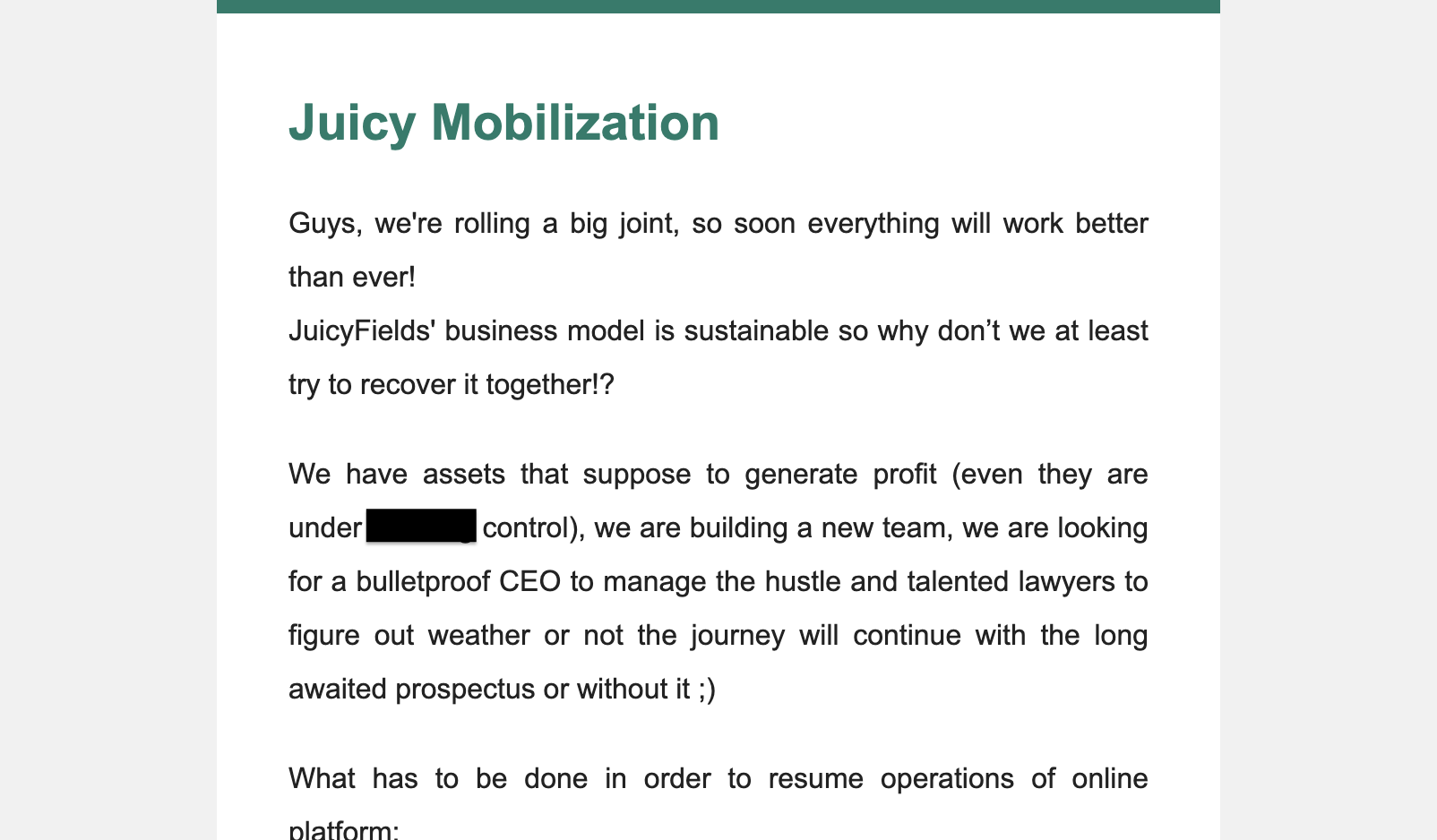
“We’re rolling a big joint.” Even after withdrawals were blocked, Juicy Fields investors received messages saying that everything would soon return to normal.
El Dorado quickly descended into chaos. Former investors—some of whom lost hundreds of thousands of euros—launched their own investigations to find out who had stolen their money. It soon became clear that a suspicious power struggle was unfolding within Juicy Fields itself. By then, the company was no longer a single entity but had splintered into four separate companies registered in Germany, the Netherlands, Portugal, and Switzerland. Documents and passports belonging to the scam’s organizers began leaking online. The thieves were turning on each other.
At the height of the chaos, Paweł Nowakiewicz received another email. It was titled “Company Announcement” and began with the line: “You have surely heard the name Graf Friedrich.”
German Count, Latino Version
Count Friedrich presents himself as a philanthropist, a German-Venezuelan lawyer, and an aristocrat—at least according to his official biography. Associates describe him as a cordial elderly gentleman who enjoys luxury and good cigars.
But according to findings by Paper Trail Media and Der Spiegel, the count was actually born the son of a farmer in Bavaria. He had a history of luring investors into shady deals and had been convicted several times for fraud and illegal banking operations. He served ten years in prison.
His origins and the authenticity of his noble title remain unclear. What matters more is how he uses it. He knows how to navigate high society and serves as president of the Global Venezuelan Social and Business Club, which promotes Venezuelan business interests worldwide. Even after his release from prison, he continued posting photos from meetings at the club’s Berlin headquarters—always featuring a portrait of Simón Bolívar in the background. In the foreground: businessmen from around the world, and occasionally, Polish lawyers.
But in a message to investors in 2022, the count’s appearance was far less aristocratic. Anonymous “founders of Juicy Fields” accused Count Friedrich of seizing control of the company through deception and attempting to gain access to its accounts. This, they claimed, was why financial institutions had frozen Juicy Fields’ funds—funds that would remain frozen until the matter was resolved.
The email more or less meant that none of the hundreds of thousands of Juicy Fields “e-growers” would be getting their money back.
So what exactly was Count Friedrich’s connection to Juicy Fields? According to an investigation by a consortium of journalists from Danish outlet DR.dk, Paper Trail Media, Correctiv, and Der Spiegel, German authorities suspect the Juicy Fields creators hired the count to help launder money. According to the mysterious “founders” (the ones behind the email warning about the rogue count), it was Friedrich who created the Dutch company Juicy Holdings BV, which took over the business—and it was he who appointed a new CEO.
To further complicate matters, Count Friedrich’s name does not appear in any official documents. Formally, the Dutch company was owned by the Swiss-based JuicyFields AG. Among the executives of that company was Friedrich’s brother—Count Stefan.
Strategists of Proxy Wars
The summer of 2022 marked the beginning of a war—or an alleged war—between the so-called “founders” of Juicy Fields and the counts. A message appeared on the Juicy Fields website, urging e-growers to ask Count Friedrich for their money. Someone even posted his photo, home address in Berlin, the name of his lawyer, his company affiliations, and his cryptocurrency wallet number.
The Juicy Fields founders also shared what they claimed was “evidence” of their former associate’s guilt: screenshots of an alleged conversation about money between Juicy Fields, Graf, and “Alex Veimer,” one of the pyramid scheme’s organizers. In the messages, Graf allegedly suggested it “would be clever” to use LC Capital as an intermediary.
LC Capital is the name of one of Friedrich’s Polish companies—we’ll return to it later.
Another supposed piece of evidence was an invoice issued to Juicy Fields for €1.8 million, allegedly earned by the Polish LC Capital.
In response to the attack by the Juicy Fields founders, Friedrich launched his own website—also bearing the Juicy Fields name—where he published his version of events. What did it say? That he never had control over Juicy Fields and that the founders were the ones who ran off with the money. Like his rivals, Graf also included specific details: each name was accompanied by the person’s role in the company structure, a passport photo, phone number, and links to social media accounts. In his account, the boss of all bosses was a Russian citizen named Paul Bergholts.
Graf’s law firm also issued a formal statement demanding clarity around the Juicy Fields scandal. The statement insisted that Graf was the true victim; that he never had access to investors’ funds; that he was cooperating with authorities; and—perhaps most ironically—that he had filed a criminal complaint against the Juicy Fields founders on August 1, 2022. The dark comedy of the situation was hard to miss: the statement claimed that the Grafs had warned potential investors about Juicy Fields as early as July 28, 2022—two weeks after the scheme’s creators had disappeared with the money.
A later investigation by Spanish, German, and French prosecutors revealed that “Paul Bergholts” was a fake identity. Behind the alias was Sergei Berezin—the same man who, according to Latvian police, was behind Recyclix, another pyramid scheme launched a decade ago in Poland (we covered it in the first part of this story on VSquare.org).
After eight years of investigation, the Polish prosecutor’s office charged only the front man—and then let him go free.
We checked: following the sudden freeze on payments to Recyclix investors, an almost identical information war broke out on its website and social media as the one later waged by the Juicy Fields operators. As far back as 2017, a photo of Berezin and his real name appeared on the Recyclix website—the Polish prosecutor’s office had him in plain sight, but failed to shut him down.
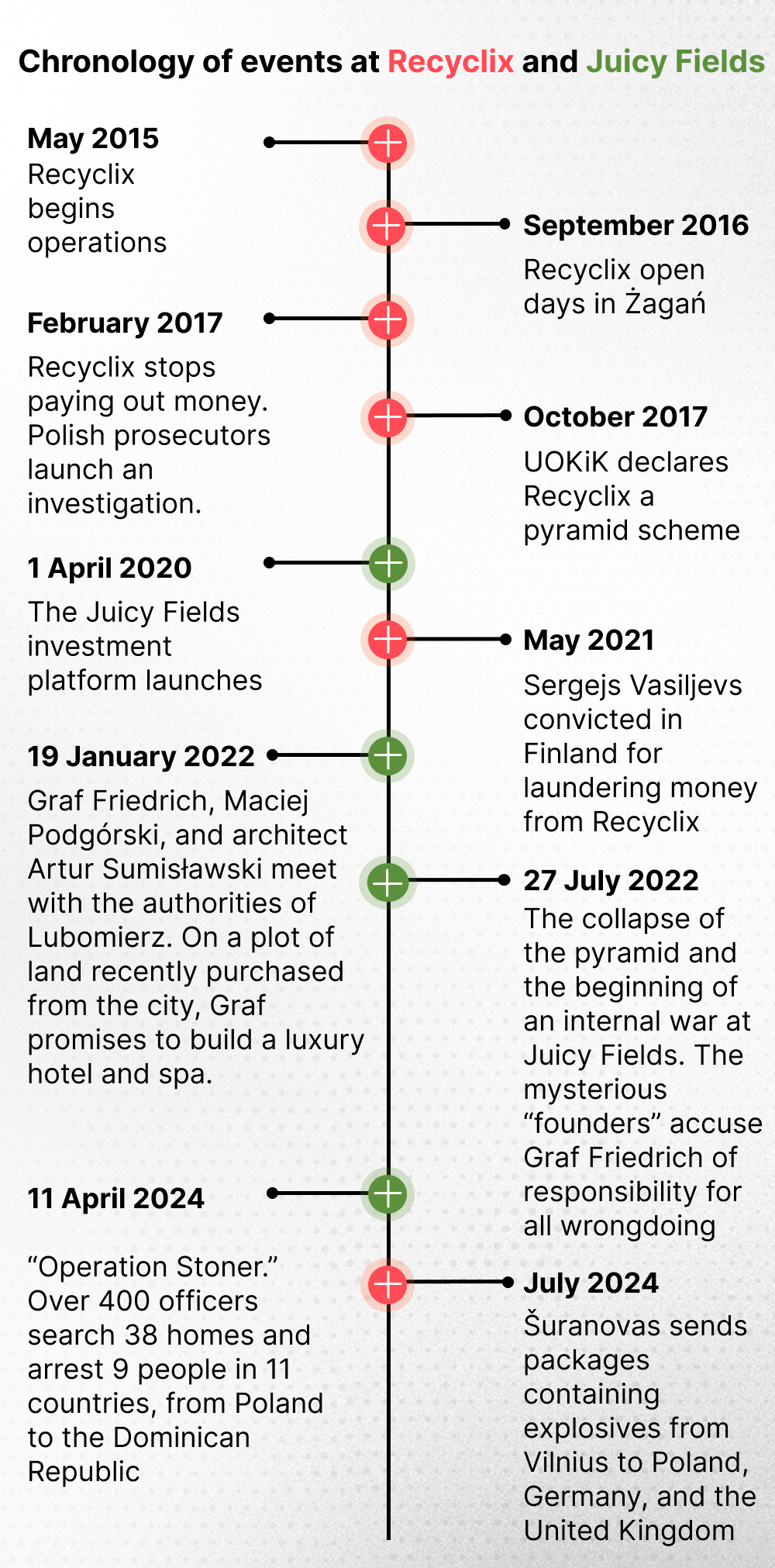
The facade wars that erupt after the collapse of pyramid schemes are part of the scammers’ strategy. The division into “good sheriffs” and “bad thieves” is designed to mislead those who still cling to the hope of recovering their money.
Although the Polish prosecutor’s office had the likely mastermind within reach, to this day it has not brought charges against Sergei Berezin or issued a warrant for his arrest. Nor has it recovered the stolen funds. Of the €39 million invested in Recyclix, only €320,000 was ever found.
Berezin was able to quietly build a new and even bigger financial pyramid—Juicy Fields—until it, too, exploded with a bang.
On the Trail of the Amber Room
In our search for clues about Count Friedrich, we find ourselves in the tiny village of Maciejowiec in Lower Silesia. On a hill, in the middle of a once-grand park, stands a crumbling two-story palace with a terrace and colonnade. This mid-19th-century monument has clearly seen better days. Broken windows and peeling plaster expose the bricks beneath. The ruins stand in stark contrast to the palace’s new roof—the only renovation Count Friedrich has carried out here in seven years.
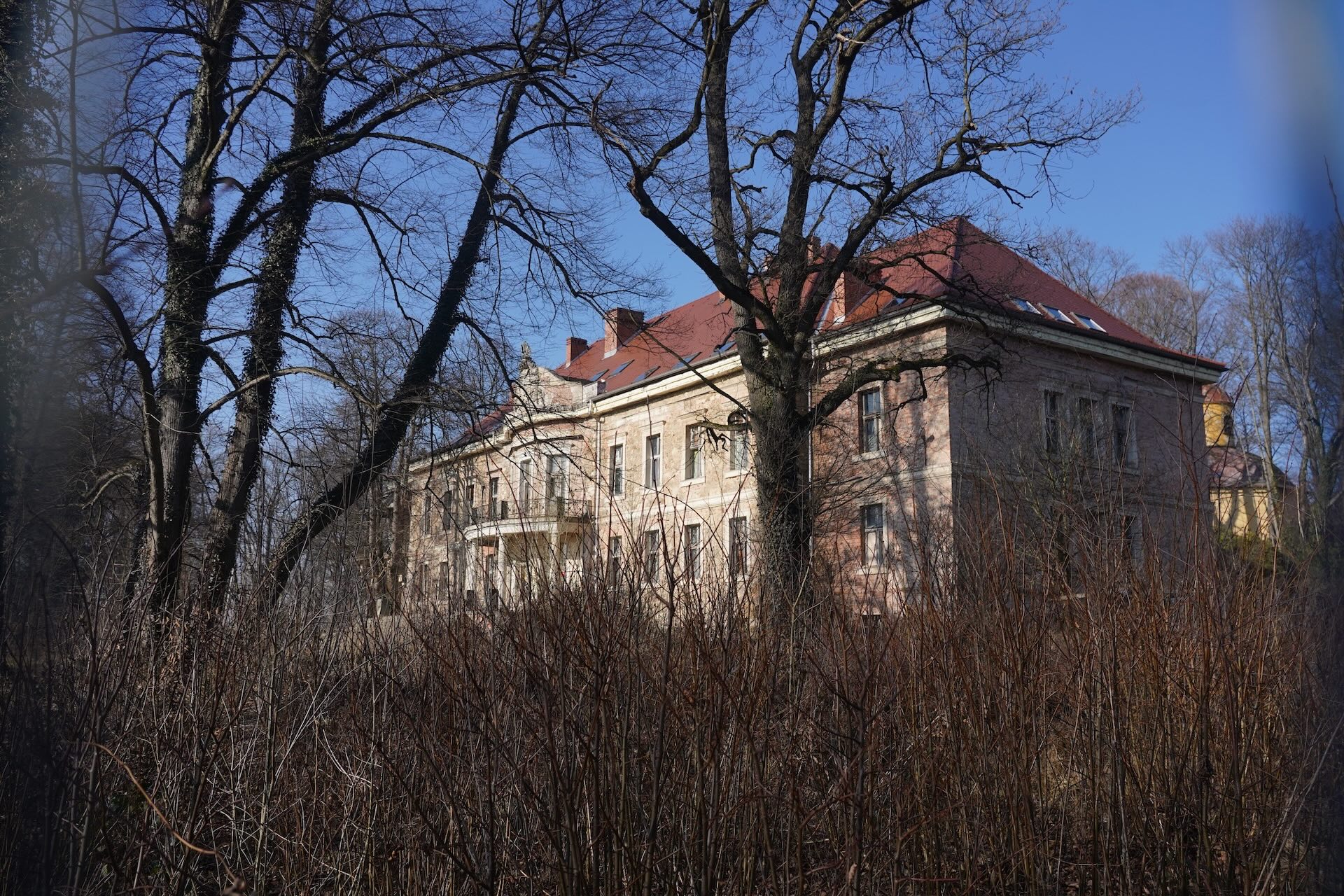
Historic palace in Maciejowiec. Photo: Krzysztof Story
Access to the park and palace is blocked by a fence, and a sign on the gate informs visitors that renovation work is underway—though there are no visible signs of any activity around the building. The listed investor is a company called L.C. (a yellow plaque on the gate proudly declares, “Tradition since 1329”). This is the company owned by Count Friedrich and his Polish wife, Aleksandra.
Residents of Maciejowiec speculate that the count bought the palace for his young bride, as the historic property was said to be the apple of her eye. Locals also say Aleksandra is an artistic soul who, in addition to investing in ruined palaces, once ran an art gallery in Berlin.
Lower Silesia is full of abandoned and dilapidated manor houses. When an eccentric millionaire buys one, he often brings with him grand visions of renovation and investment. Count Friedrich was no exception—he reportedly wanted to purchase a nearby chapel in addition to the palace. He and his wife also tried to cultivate ties with the local community: she sponsored the village’s St. Nicholas Day celebrations and even took select residents on helicopter rides.
But such grand plans often stir local skepticism. The plans of the rich aroused the distrust of the locals, and when the investor came from Germany, whispers about golden trains and amber chambers began. In Maciejowiec, some residents still say the count’s family used ground-penetrating radar to search for hidden treasures in the area.
Most of these stories end much like the one in Maciejowiec: with a yellow plaque on the gate and renovations that never seem to happen.
The colorful history of the palace has no direct connection to Juicy Fields—the count purchased it two years before the pyramid scheme was launched. But his investments in Lower Silesia didn’t end there—and this is where things get really interesting.
You Had, Count, the Golden Corner
A low building near the palace contains seven apartments: three are owned by the L.C. company, one belongs to Count Friedrich himself, another to his wife, and the remaining units are rented out to tourists seeking peace and quiet in the Sudetes.
We checked: between 2019 and 2023, Count Friedrich and his company purchased these properties. Does this mean the count spent money from Juicy Fields in Lower Silesia?
We find no direct evidence of that. However, we do confirm that two of the apartments are under what’s known as a prosecutor’s security—at the request of the Berlin public prosecutor’s office. They cannot be sold until the investigation into Juicy Fields is concluded.
There’s another address in Maciejowiec: a large, renovated house—perfect for agritourism. Count Friedrich’s company bought it in 2021. The renovation appears complete, and lights are on inside. But locals tell us that nothing has happened there since international police carried out Operation Stoner in Maciejowiec. When we step off the sidewalk and approach the front door, an alarm siren blares. This house, too, has been secured by the prosecutor’s office.
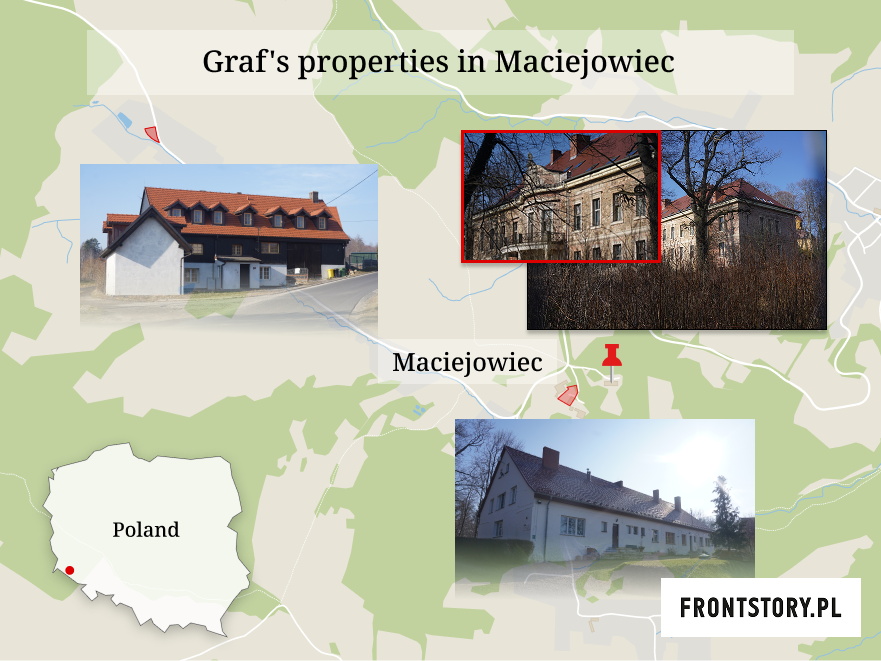
On April 11, 2024, when several hundred police officers arrested the creators of Juicy Fields across countries from the Dominican Republic to Poland, the Germans in Maciejowiec initially mistook Count Friedrich for a local forester. But the count wasn’t at the palace—he had been arrested in Berlin.
Today, the Juicy Fields investigation is being led by German and Spanish prosecutors. Count Friedrich has since been released from custody. Meanwhile, Polish investigators have seized his properties in Lower Silesia, valued at PLN 5.5 million. In addition to the apartments and the house in Maciejowiec, the prosecutor’s office secured two plots of land and a tenement house in the center of nearby Lubomierz.
Where did the tenement house come from? Count Friedrich’s company purchased it from the city. “An open oral tender took place in February 2022. Plot number 78, a tenement house known as Złoty Róg (Golden Corner), was ultimately sold for PLN 350,000,” recited Janusz Lichocki, deputy mayor of Lubomierz.
The Golden Corner—a historic but crumbling tenement just behind the town hall—now belongs to the L.C. company. Two film sculptures, Kargul and Pawlak, stand in stoic silence in front of the nearby museum, watching over the building. Much of Lubomierz stands “alone,” as many scenes from Sylwester Chęciński’s beloved film trilogy were shot here.
“This was the fourth attempt to sell the tenement house,” recalled Deputy Mayor Lichocki. “It had become an eyesore in the town center. Then an investor appeared and said he wanted to do something good and restore the historic building.”

Sculptures of Kargul and Pawlak watch over the ruined historic tenement house known as the “Golden Corner”. Photo: Krzysztof Story
At the time, the town authorities believed Count Friedrich when he presented his investment plans—despite the fact that everyone already knew similar promises to renovate the palace in Maciejowiec had come to nothing. Today, the Golden Corner is draped in a semi-transparent safety net, meant to keep crumbling plaster from falling on passersby.
The count’s investments in Lubomierz are now under review by an audit committee, which is examining the case of the Golden Corner along with two nearby plots of land.
The first plot was purchased by Count Friedrich at auction in the fall of 2021. For the second, the city announced a limited tender open only to owners of adjacent properties. L.C. was the sole bidder and bought the centrally located plot in August 2023 for PLN 99,000.
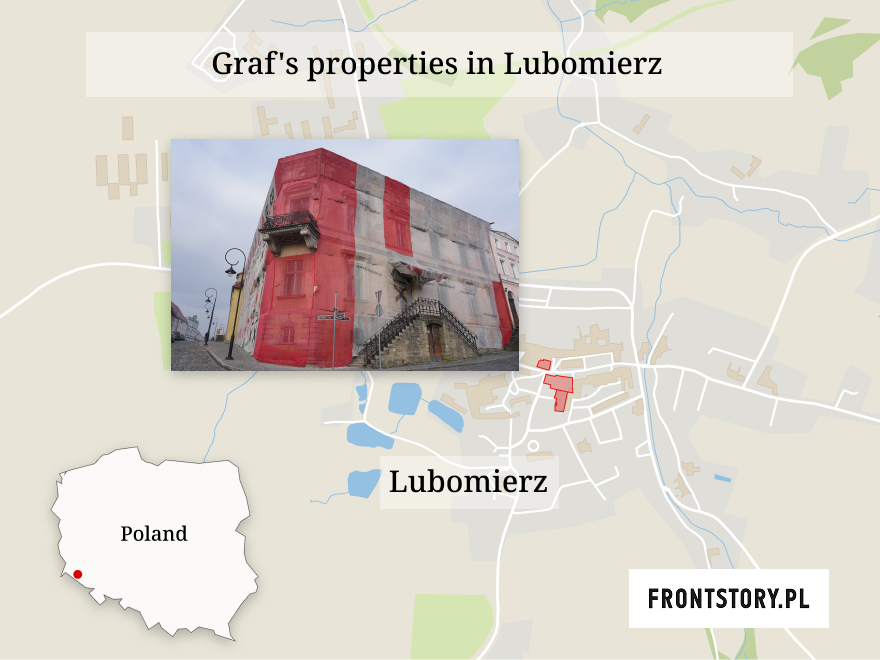
Marek Ciereszko, chairman of the town council, believes the price was too low for the value of the land. Following the elections, the new authorities appointed a commission to investigate the transaction.
A Spa, a Prosecutor, and a Sinking Ship
Count Friedrich made considerable efforts to convince the Lubomierz councilors to sell the second plot. In January 2022, he met with them to present his vision for the new development. He was accompanied by his business partner—and brother-in-law—Maciej Podgórski. Together, they unveiled plans for an elegant hotel with 117 rooms.
Their architect helped sway the local officials, emphasizing the appeal of the project: “The advantage of our investment is that we’ve allocated a significant amount of space for a spa and a swimming pool. In our view, that’s a key feature that can attract potential tourists.”

Plans for the new hotel presented by the count to the authorities of Lubomierz. Photo: lwowecki.info
“According to the notarial deed, the owners were to begin the renovation within three years and complete it within five. This did not happen,” said Deputy Mayor Lichocki. “We have no contact with Mr. Graf Friedrich. He is represented by his attorney, Mr. Podgórski.”
In January 2025, Maciej Podgórski met with city authorities. He stated that the company was still preparing for the investment and seeking sources of financing. He did not mention that the count had recently been released from custody and was facing charges related to the scandal. Nor did he disclose that the prosecutor’s office was investigating Count Friedrich’s properties.
We find Maciej Podgórski—brother of the count’s wife, the one who sponsored Mikołajki and the helicopter—in one of the apartments next to the palace.
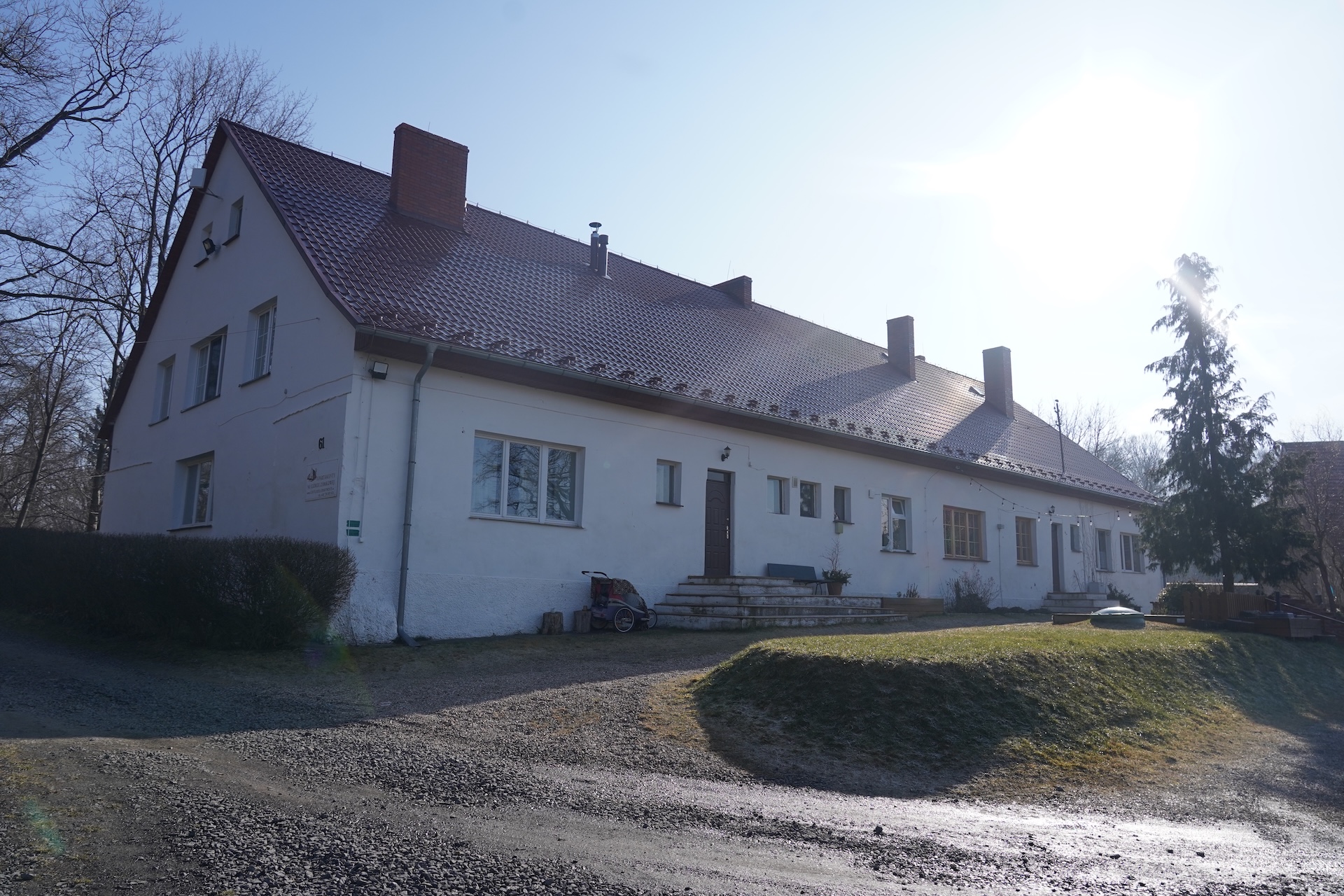
Most of the apartments in the building near the palace belong to the count. Photo: Krzysztof Story
We find him stretched out on a couch, his leg in a cast. A burly man with a reddish beard, he tells us that just a week earlier, he had a brush with death when he slipped and fell down an icy slope in the Karkonosze Mountains. He wonders aloud whether he should answer journalists’ questions, but ultimately decides not to. He seems unsettled by our visit, yet doesn’t ask us to leave for a good half hour.
Since his arrest in “Operation Stoner,” he says, he has been living in constant fear. Despite this, he remains a proxy in the L.C. company and serves as either a board member or CEO of two other companies owned by Graf. Why hasn’t he cut business ties with his brother-in-law? Well, he says, he didn’t want to abandon a sinking ship. Is the ship really sinking? During our meeting in Maciejowiec, Podgórski tries to convince us that Count Friedrich is the innocent victim of malicious actors.
We check: before becoming investor Count Friedrich’s right-hand man, Maciej Podgórski had little business experience. According to neighbors, he worked in insurance and helped his wife sell woven decorations. When we ask him about his business qualifications, he offers no response.
After the meeting in Maciejowiec, we sent him several questions by email. His lawyer replied: “I have not resigned because, thanks to my position, I have insight into internal events and know that there has been no abuse or fraud. Despite concerns for my family’s safety, I believe that resigning could be seen as an admission of guilt.”
The Losers Don’t Brag
The victims of Juicy Fields are scattered across the continent. In Germany alone, more than 3,000 victims have already reported the crime to the prosecutor’s office. The platform was less popular in Poland, but there is no shortage of victims there either—Polish investors even had their own group on Russian Telegram.
However, the Polish prosecutor’s office did not launch its own investigation. We have learned that the count’s assets were secured and his properties in Lower Silesia searched at the request of the Berlin prosecutor’s office. Investigators visited Maciejowiec, Wrocław, Warsaw, and Piaseczno. They interviewed two witnesses and examined two phones. In addition, officers from the Central Bureau for Combating Cybercrime arrested Nikolai Mikhailuk—one of Berezin’s most trusted associates—and seized his electronic equipment in Lublin. The Russian national is now in custody in Spain.
People in the Pyramid Scheme – Who’s Who?
Most Polish victims of Juicy Fields refuse to speak publicly, though many are willing—albeit anonymously—to share how much they lost in the scam. It’s not out of fear, but because they see no point in reopening old wounds. They hold no hope of recovering their money.
“It’s all a psychological mechanism, and the scammers know it well,” said Paweł Nowakiewicz, a financier who lost his retirement savings in the pyramid scheme. “First, you feel ashamed for falling for it. When you lose so much that you have to move into a smaller apartment, you don’t exactly brag about it.”
In this story, even hope came at a cost. After the collapse, it was sold by Swedish lawyer Lars Oloffson. He adopted the persona of a Scandinavian sheriff—a former commando and seasoned expert in tracking down international fraudsters.
It was Oloffson who connected journalists, including those from the Danish site DR.dk, with Igor Kekshin, Berezin’s associate at Juicy Fields who agreed to testify against him.
But Oloffson’s role in the case remains ambiguous. He announced a legal crusade: effective class-action lawsuits against the architects and enablers of Juicy Fields—including Facebook, where the scammers advertised—and promises to recover the stolen funds. According to reporting by Svenska Dagbladet, victims could join the fight for just €100; later, the fee rose to €150.
Gray hair, a stern gaze, and bold declarations weren’t enough. Oloffson didn’t recover a single cent. Instead, Swedish journalists began to scrutinize his own story.
According to their publication, the alleged sheriff turned out to be yet another fraudster, preying on the desperation of Juicy Fields’ victims. There is no record of his commando career in any military archives. Oloffson completed only the compulsory military service that was mandatory at the time, and he already has three convictions for financial fraud. He served a prison sentence in 2014.
We contacted Lars Oloffson. He firmly denied all allegations, insisting they were fabricated, and promised to send us the lawsuit he had filed against the editors of Svenska Dagbladet.
In any case, the chances of recovering the lost money remain slim. Investigators across Europe—including in Poland—are trying to seize Juicy Fields’ assets, but the companies and partnerships behind the pyramid scheme in Germany and the Netherlands have declared bankruptcy, and only a few million euros have been recovered so far.
According to Correctiv.org, investigators found that around five million euros from Juicy Fields ended up on the Garantex cryptocurrency exchange in Moscow—an exchange currently under U.S. sanctions.
Paweł Nowakiewicz, like many defrauded investors, initially fought hard, conducting his own investigation. Eventually, he gave up. “At some point, you just have to start living again. Sure, I’d like to get my money back. But no one has managed to do that yet.”
From Lubomierz to Caracas
There is nothing on Count Friedrich Graf’s social media to suggest he is suspected of involvement in one of the biggest financial scams of the century. Nothing about Juicy Fields. Nothing about marijuana. Nothing about palaces or tenement houses. Instead, the count mostly comments on events in Venezuela. When local dictator Nicolás Maduro “won” a blatantly rigged election, Graf wrote: “God will lead him on his path.”
No one has seen him in Poland since “Operation Stoner,” and he seems more preoccupied with what’s happening in Caracas than in Maciejowiec. But that doesn’t mean his business in Poland is over. We’ve established that three of Graf’s companies are still operating in the country: L.C., LC Alternatywna Spółka Inwestycyjna, and LC Capital (the last of which was already known). Let’s recall: at the height of the scandal, the creators of Juicy Fields published screenshots of a conversation in which Graf allegedly suggested using LC Capital as an intermediary to move money. (Graf claims the screenshots are fake.)
L.C. owns property in Lower Silesia, including the so-called “prosecutor’s” properties. We contacted Graf by email and urged him to speak with us. He responded through his lawyer, stating that he had not invested any Juicy Fields money in Poland, that he himself was a victim of the scheme, and that he is cooperating with the authorities. He added that investments in Poland would begin “in the near future.”
Why did he purchase so many properties in Lower Silesia? “This beautiful region has a rich cultural and architectural heritage,” he replied. “The reason for the investment was a genuine interest in renovation and tourism potential, as well as the growing attractiveness of historic properties in the Polish countryside.”
Former President, Count, and Interpol
The count’s two other companies are also involved in investments. LC ASI states on its website that it is raising funds to purchase a Portuguese bank (for €24 million), to build a luxury hotel in Lubomierz, and to renovate Maciejowiec. We asked about these ventures, but the count declined to comment on the company’s activities, while Maciej Podgórski denied that LC ASI has any plans to acquire a Portuguese bank.
Ludwik Sobolewski, the former president of the Warsaw Stock Exchange, sits on the supervisory board of LC ASI. It’s not the first time his name has surfaced in a questionable context. In 2013, he was dismissed from his position at the stock exchange after it emerged that a colleague—at Sobolewski’s request—had solicited investors for the film Klątwa Faraona(The Curse of the Pharaoh), directed by Patryk Vega. One of the leading roles was meant for Sobolewski’s partner.
In 2018, Sobolewski co-founded the crowdfunding platform Emerging Europe Marketplace with Michał N., who, according to Puls Biznesu, had previously been convicted three times for economic crimes. Just a year before launching the venture with Sobolewski, Michał N. had spent five months in custody.
Sobolewski joined the supervisory board of LC ASI in August 2024—after Graf’s arrest. So what connects him to a man wanted by prosecutors and Interpol? How does he know Count Friedrich?
In an interview with FRONTSTORY.PL, Sobolewski repeatedly stressed that he had no knowledge of the pyramid scheme, Graf’s involvement in Juicy Fields, or the related arrests. He claimed not to know what Juicy Fields even is. If something were wrong, he said, the Financial Supervision Authority (KNF) would surely have acted. He declined to say where or when he met Count Friedrich.
The KNF responded to our questions by confirming that Graf Friedrich’s company was entered into the register of alternative investment companies before his arrest. The company may be removed from the register if the Commission becomes aware of a legal violation.
But does the KNF know that Count Friedrich is a suspect in the Juicy Fields scandal being investigated by German prosecutors? “The information you refer to,” the Commission replied, “is currently being investigated by the KNF.”
Neither the KNF’s “interest,” nor “Operation Stoner,” nor any spectacular raids can disguise the authorities’ helplessness in the face of schemes like Juicy Fields. A year after the arrests, most of the architects of the pyramid scheme still haven’t been charged, and investigations are ongoing. According to investigators, the gang defrauded €645 million. Only a fraction of that is expected to be recovered. In Poland, the prosecutor’s office has valued Graf Friedrich’s secured properties at 5.5 million złoty—just two per mille of the total losses. The lion’s share of the money has vanished, like smoke from medicinal marijuana.
The Polish version of this story was published on FRONTSTORY.PL.
Subscribe to “Goulash”, our newsletter with original scoops and the best investigative journalism from Central Europe, written by Szabolcs Panyi. Get it in your inbox every second Thursday!
| This investigation is part of the CIJI project, supported by the European Union. |  |
| All opinions expressed within the scope of this project represent the opinion of their authors and not those of the European Union |  |
An investigative journalist at FRONTSTORY.PL, Daniel Flis previously was on the investigative team of OKO.press and Gazeta Wyborcza. OCCRP Research Fellowship Program recipient. Participant in international investigative projects of the Reporters Foundation.
A freelance journalist, regularly published by “Tygodnik Powszechny”. Previously worked for i.a. “Gazeta Wyborcza”, “Newsweek”. Part-time traveller and mountaineer. Based in Cracow, Poland.







